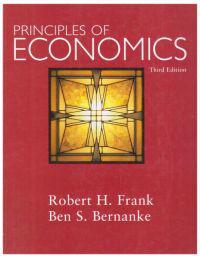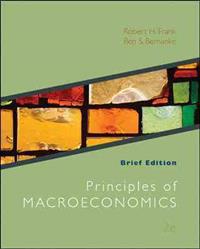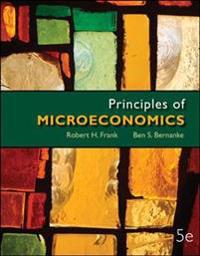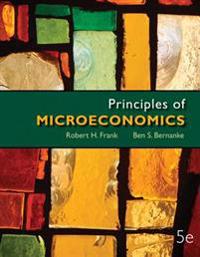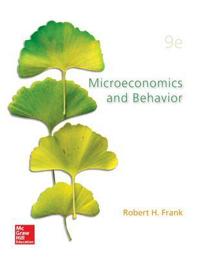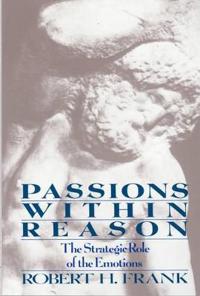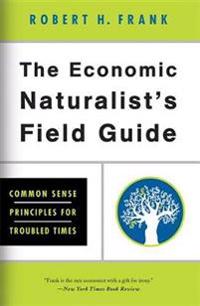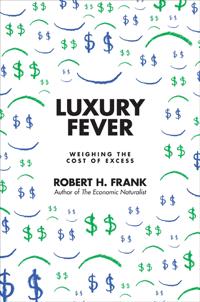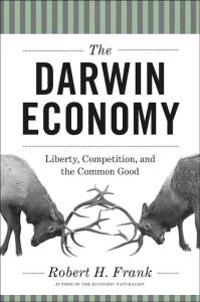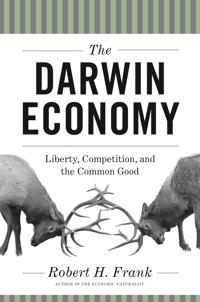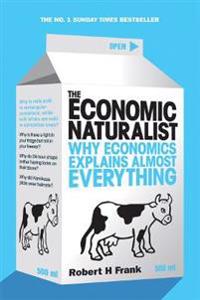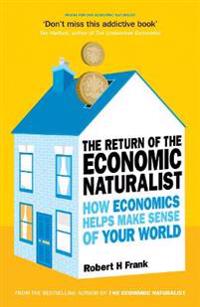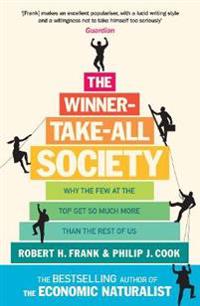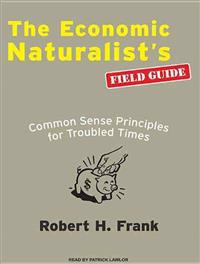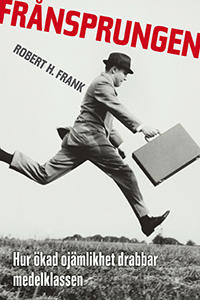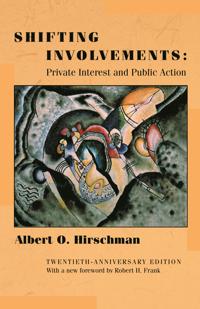Microeconomics and Behavior (Häftad)
avRobert H. Frank
ISBN: 9780070166745 - UTGIVEN: 200911Robert Frank's "Microeconomics and Behavior" covers the essential topics of microeconomics while exploring the relationship between economics analysis and human behavior. The book's clear narrative appeals to students, and its numerous examples help students develop economic intuition. This book int[...]
PRINCIPLES OF ECONOMICS; AND DISCOVERECON CODE CARD (Häftad)
avROBERT H. FRANK, BEN BERNANKE
ISBN: 9780071108157 - UTGIVEN: 200601Encourages students to become "Economic Naturalists," people who employ basic economic principles to understand and explain what they observe in the world around them. This book presents concepts through examples drawn from familiar contexts.[...]
Principles of Microeconomics (Häftad)
avRobert H. Frank, Ben Bernanke
ISBN: 9780071285407 - UTGIVEN: 200810Now with an increased focus on international trade, this microeconomic principles book is suitable for all undergraduate economics students.[...]
Microeconomics and Behavior (Inbunden)
avRobert H. Frank
ISBN: 9780073375946 - UTGIVEN: 200911Robert Frank's "Microeconomics and Behavior" covers the essential topics of microeconomics while exploring the relationship between economics analysis and human behavior. The book's clear narrative appeals to students, and its numerous examples help students develop economic intuition. This book int[...]
Principles of Macroeconomics (Häftad)
avRobert H. Frank, Ben Bernanke
ISBN: 9780077316761 - UTGIVEN: 201011In recent years, innovative texts in mathematics, science, foreign languages, and other fields have achieved dramatic pedagogical gains by abandoning the traditional encyclopedic approach in favor of teaching a shorter list of core principles in depth. Two well-respected writers and researchers, Bob[...]
Principles Of Macroeconomics (Pocket)
avRobert H. Frank, Ben Bernanke
ISBN: 9780077318505 - UTGIVEN: 2012-03-01Frank/Bernanke also encourages students to become "Economic Naturalists," by employing basic economic principles to understand and explain what they observe in the world around them. An economic naturalist understands, for example, that infant safety seats are required in cars but not in airplanes b[...]
Principles of Microeconomics (Häftad)
avRobert H. Frank, Ben Bernanke
ISBN: 9780077318512 - UTGIVEN: 201203In recent years, innovative texts in mathematics, science, foreign languages, and other fields have achieved dramatic pedagogical gains by abandoning the traditional encyclopedic approach in favor of teaching a shorter list of core principles in depth. Two well-respected writers and researchers, Bob[...]
Principles of Microeconomics (Häftad)
avRobert H. Frank, Ben S. Bernanke
ISBN: 9780077464363 - UTGIVEN: 201202Microeconomics and Behavior (Inbunden)
avRobert H. Frank
ISBN: 9780078021695 - UTGIVEN: 2014-01Robert Frank's Microeconomics and Behavior covers the essential topics of microeconomics while exploring the relationship between economic analysis and human behavior. Core analytical tools are embedded in a uniquely diverse collection of examples and applications to illuminate the power and versati[...]
Passions within Reason (Häftad)
avRobert H. Frank
ISBN: 9780393960228 - UTGIVEN: 1991-03The idea rests on a simple paradox, namely, that in many situations the conscious pursuit of self-interest is incompatible with its attainment. We are all comfortable with the notion that someone who strives to be spontaneous can never succeed. So too, on brief reflection, will it become apparent th[...]
The Economic Naturalist's Field Guide: Common Sense Principles for Troubled Times (Häftad)
avRobert H. Frank
ISBN: 9780465019014 - UTGIVEN: 201004Falling Behind: How Rising Inequality Harms the Middle Class (Pocket)
avRobert H. Frank
ISBN: 9780520280526 - UTGIVEN: 2013-10-25Luxury Fever (Häftad)
avRobert H. Frank
ISBN: 9780691146935 - UTGIVEN: 201002The turn of the twenty-first century witnessed a spectacular rise in gross consumption. With the super-rich setting the pace, everyone spent furiously in a desperate attempt to keep up. As cars and houses grew larger and more expensive, the costs were enormous - not only monetarily but also socially[...]
What Price the Moral High Ground?: How to Succeed without Selling Your Soul (Övrig)
avRobert H. Frank
ISBN: 9780691146942 - UTGIVEN: 2010-02-21Financial disasters - and stories of the greedy bankers who precipitated them - seem to underscore the idea that self-interest will always trump concerns for the greater good. Indeed, this idea is supported by the prevailing theories in both economics and evolutionary biology. But is it valid? In "W[...]
The Darwin Economy (Inbunden)
avRobert H. Frank
ISBN: 9780691153193 - UTGIVEN: 201108Who was the greater economist - Adam Smith or Charles Darwin? The question seems absurd. Darwin, after all, was a naturalist, not an economist. But Robert Frank, "New York Times" economics columnist and best-selling author of "The Economic Naturalist", predicts that within the next century Darwin wi[...]
The Darwin Economy (Häftad)
avRobert H. Frank
ISBN: 9780691156682 - UTGIVEN: 201209Who was the greater economist - Adam Smith or Charles Darwin? The question seems absurd. Darwin, after all, was a naturalist, not an economist. But Robert Frank, "New York Times" economics columnist and best-selling author of "The Economic Naturalist", predicts that within the next century Darwin wi[...]
Economic Naturalist (Häftad)
avRobert H. Frank
ISBN: 9780753513385 - UTGIVEN: 200804Economics doesn't just happen in classrooms or international banks. It is everywhere and influences everything we do and see, from the cinema screen to the streets. This book reveals why many of the most puzzling parts of everyday life actually make perfect (economic) sense.[...]
Return of The Economic Naturalist (Häftad)
avRobert H. Frank
ISBN: 9780753519660 - UTGIVEN: 200905Shows how our personal choices about everything from paying for food and housing to large-scale policy decisions about taxation and the regulation of markets all boil down to the same simple economic principles, often resulting in the same wasteful mistakes.[...]
The Winner-take-All Society (Pocket)
avRobert H. Frank, Philip J. Cook
ISBN: 9780753522264 - UTGIVEN: 201006Why does the top one per cent of the population capture such a disproportionate amount of the wealth? Why do top athletes win dozens of sponsorship deals, yet competitors who finish just moments behind struggle to attract a single deal? Why does one product become a runaway success, while others flo[...]
Economic Naturalists Field Guide: Common Sense Principles for Troubled Times (CD-bok)
avRobert H. Frank
ISBN: 9781400111862 - UTGIVEN: 2009-06How do people actually behave when confronted with economic choices? And remember, almost every choice we make is economic. While our desires are boundless, our resources are limited and tradeoffs confront us at every turn. Arguing that self-interest alone cannot explain the choices we make, Robert [...]
Frånsprungen : hur ökad ojämlikhet drabbar medelklassen (Häftad)
avRobert H. Frank
ISBN: 9789179242169 - UTGIVEN: 200905Vad sker i ett samhälle när de som redan är rika blir ännu rikare och allt mer avlägsnar sig från folkflertalet och dess villkor? I Frånsprungen visar Robert H. Frank hur den ökade ojämlikheten i USA har drivit fram en "utgiftskapprustning" där medelklassen utarmas i sina försök att hål[...]
Principles of Microeconomics (Pocket)
avBernanke, Ben, Frank, Robert H
ISBN: 9780071220798 - UTGIVEN: 2010-10-01Shifting Involvements (Pocket)
avAlbert O. Hirschman, Robert H. (FRW) Frank, Albert O. Hirschman
ISBN: 9780691092928 - UTGIVEN: 2002-01Why does society oscillate between intense interest in public issues and almost total concentration on private goals? In this classic work, Albert O. Hirschman offers a stimulating social, political, and economic analysis dealing with how and why frustrations of private concerns lead to public invol[...]
Studyguide for Microeconomics and Behavior by Frank, Robert H., ISBN 9780073375731 (Häftad)
avCram101 Textbook Reviews, Cram101 Textbook Reviews
ISBN: 9781617447013 - UTGIVEN: 2010-12



